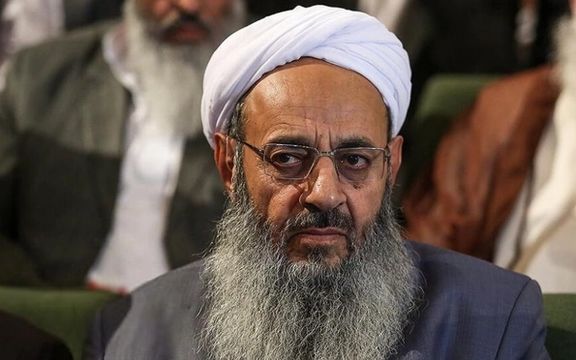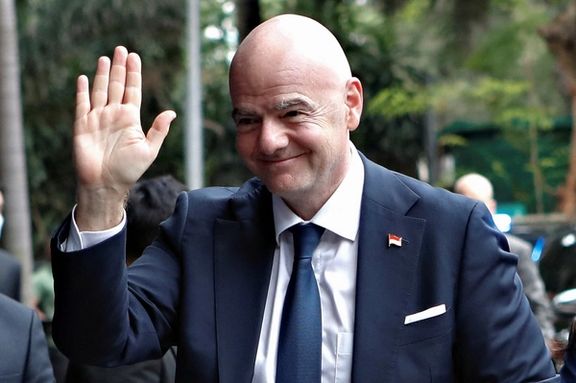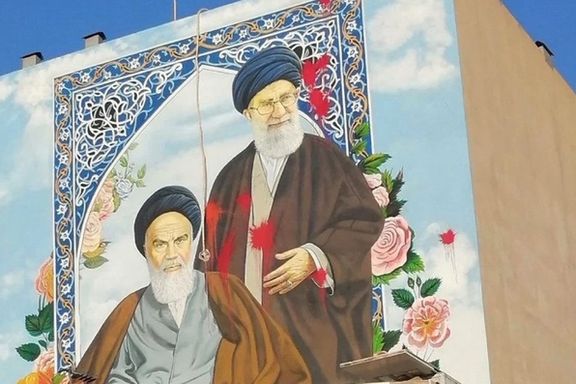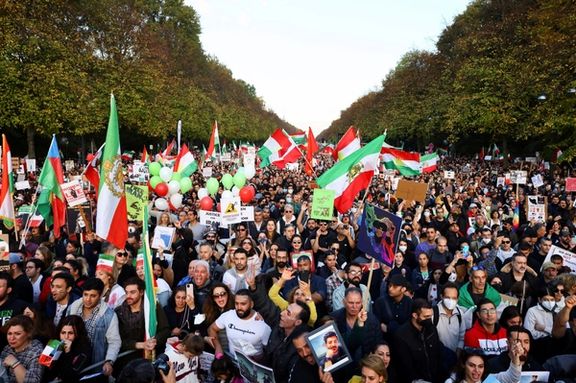Iran's 1979 Hostage Taking Likely Work Of Soviets – Ex-Lawmaker

A former parliamentary leader In Iran says the occupation of the US embassy in Tehran in November 1979 was an ‘unnecessary’ action probably done under direction of the Soviet embassy.

A former parliamentary leader In Iran says the occupation of the US embassy in Tehran in November 1979 was an ‘unnecessary’ action probably done under direction of the Soviet embassy.
Outspoken conservative politician Ali Motahari, who was deputy-speaker in the previous parliament, made the comment in a tweet on Friday, as the regime sponsored pro-government rallies across the country to commemorate the occupation of the US embassy and taking dozens of American diplomats hostage for 444 days.
The former senior lawmaker, who has often criticized hardliners in recent years, said the attack on the embassy and taking hostages for such a long time was carried out by a leftist group of individuals “that diverted the Islamic Revolution from its original path.”
He added that the hostage crisis made it difficult to present the Islamic Revolution to the world and paved the ground for the Iraqi invasion of Iran under Saddam Hussein.
On the fourth of November 1979, a group of radical students who were followers of Ayatollah Ruhollah Khomeini stormed the US Embassy in Tehran and took 52 US diplomats and citizens hostage, marking the moment as the start of Iran’s hostage diplomacy. Since then, Iran has detained many dual nationals visiting the country and has used them as bargaining chips against Western countries, human rights organizations have said.

A top Sunni cleric in Iran has called for an internationally monitored referendum, saying by killing and suppression the government cannot push back a nation.
During his Friday sermon, Molavi Abdolhamid, the Friday prayer Imam of Zahedan told regime leaders, “By killing, beating, and arresting, you cannot push back a nation that has been protesting in the streets for 50 days now.”
Addressing the government, he said “Now, the majority of people are unhappy. If you don't agree, hold a referendum with the presence of international observers and accept the result.”
By calling for a free referendum to decide the future form of government, Abdolhamid echoed a long-held demand by critics and opponents of the Islamic Republic. It marks a turning point for the Sunni leader who has long tried to survive in the dangerous environment of a Shiite religious theocracy.
Abdolhamid supported the presidency reformist Mohammad Khatami and moderate Hassan Rouhani in the past.
In 2021, he complained that neither had delivered on their promises of improving the conditions of the Sunni minority and giving them a share in the government and said he would vote for hardliner Ebrahim Raisi but was disappointed once again.
In October 2021, Abdolhamid who was known as a rights defender in the past said he hoped the Taliban “can become muscle for the Islamic Republic” and called on other countries not “to pre-judge the Taliban”, arguing that the group had changed, and its critics were exaggerating their shortcomings. Abdolhamid’s pro-Taliban statements led to criticism among Iranians and even among the Baluch people.
But when security forces killed scores of Sunnis during protests on September 30, Abdolhamid held Supreme Leader Ali Khamenei responsible.
The attack by the IRGC left more than 90 unarmed Baluch citizens dead as reported by human rights watchdogs in Iran and abroad.
Security forces once again opened fire at protesters with live ammunition while a huge crowd of people chanted “Death to Khamenei” and “Death to Dictator” during protests in the southeastern Sistan and Baluchestan following Friday prayers.
The incident followed weeks of brutal crackdown by the IRGC and other Iranian security forces on protesters in the provincial capital Zahedan, who have joined the nationwide antigovernment protests triggered by the death in custody of 22-year-old woman Mahsa Amini.
The government used violence against demonstrators in Zahedan, Saravan, Khash, Rask, and Sarbaz in the province on Friday after prayers.
Baluch activists announced that several people have been shot and killed in Khash and Zahedan by security agents. Reports say many more have also been injured.
Iran’s state-run media outlets say some protesters attacked the office of Khash governor and torched a police car while security forces fired tear gas and shot at angry demonstrators.
Gunmen on top of the Khash governor's building shooting at protesters
Friday coincides with the commemoration ceremonies for some other young people killed in previous protests.
After calling on people to keep up with their demonstrations on Friday, Iranian exiled Prince Reza Pahlavi once again urged them to mark the memory of those killed by the authoritarian regime as well.
He also called on leading democraciesto “further isolate and increase pressure on the regime, while expanding efforts to provide support to the people.”
Videos received by Iran International show people in Esfahan, Shahinshahr, and Karajheld gatherings to pay respect to those murdered forty days ago.
Iran has been gripped by nationwide protests against the rule of Supreme Leader Ali Khamenei for almost seven weeks, but the authorities keep blaming the protests on foreign countries claiming that “some limited numbers of youths are deceived by enemies”.
In its latest, Commander of Iran’s Revolutionary Guard Hossein Salami once again threatened “the Islamic Republic’s enemies” with revenge for their “interventionist and mischievous actions” on Thursday.
Salami had threatened Iranians October 30 not to take to streets anymore, but the people turned out in greater numbers to stage protests this week.

While FIFA urged teams to avoid political battles, a former Iran national footballer has called on fans not to travel to Qatar to watch FIFA World Cup matches.
Sosha Makani, the ex-goalkeeper of Iran’s national team said in a video on his Instagram on Thursday that it’s wrong to go to Qatar to watch football matches because the Iranian regime will exploit their presence in stadiums to tell the world they are support the Islamic Republic.
Referring to the brutal killing of Nika Shakarami by government security forces, he stressed that Iranians must use every chance to tell the world the Islamic Republic is a “child killer”.
“This government and its filthy supporters murder a 16-year-old girl and to evade the consequences throw her off a building, so don’t you think they will exploit your slogans at the World Cup? Use your tribunes to shout, “Death to the Child-killing Islamic Regime,” he added.
Nika Shakarami’s body was found in suspicious circumstances ten days after she left home to take part in a protest rally against compulsory hijab on September 20. Authorities claimed that she was thrown off a roof or jumped to her death after taking part in the protests.
FIFA President Gianni Infantino on Thursday wrote to the World Cup teams asking them to concentrate on soccer in Qatar and not let ideological “battles” be dragged into football fields.

“We know football does not live in a vacuum and we are equally aware that there are many challenges and difficulties of a political nature all around the world… [but] at FIFA, we try to respect all opinions and beliefs, without handing out moral lessons to the rest of the world,” Infantino said in his letter.
As 2022 World Cup kicks off in almost two weeks, a group of Iranian sportspeople said due to regime’s violence and discrimination they have no other choice but turn their backs to their national team.
Theses former karate, wrestling, and judo champions sent a letter to FIFA last week urging that the Islamic Republic be expelled from the tournament.
Ex-wrestling champion Sardar Pashaei who was one of the signatories said, “Iran is different from any other country. A football federation should be independent, but in Iran, it's a joke.”
“Everything is controlled by the Revolutionary Guards. Enough is enough. We believe that Iran is killing protesters. They should be banned until we have a democratic country like any other country in the world,” underlined Pashaei.
Former and current Iranian national football players including Ali Karimi, Ali Daie, Medhi Mahdavikia, Merhrdad Pouladi, Sardar Azmoun, Hossein Mahini, Voria Ghafouri and Aref Gholami were among the athletes raising their voice against the government crackdown on protesters.
Ali Karimi was one of the first celebrities who condemned the death of Mahsa Amini. Since then, Karimi has voiced support for protesters on social media becoming an icon for them.
Soccer legend Ali Daei also called on the government to “solve the problems of the Iranian people rather than using repression, violence and arrests.”
He also rejected the narrative of the regime regarding the death of a 15-year old girl in her birthplace Ardabil saying he does not believe Asra Panahi had died of heart failure and dismissed as “rumors” that she had taken her own life.
Mehdi Mahdavi Kia, on Friday lashed out at the government on his Instagram page saying “Shame on those who divided the country into insiders and non-insiders.”

Statements by several Iranian officials lately show that despite often defiant rhetoric, they begin to fear that the Islamic Republic might be nearing its end.
On Thursday, the escalation of unrest in Karaj, Tehran, Amol, Ghazvin, Esfahan and many other Iranian cities took the protests in Iran to a new height and intensity.
Zabihollah Khodaeian, the chairman of State Auditing Organization has said that "Enemies believe the Islamic Republic is finished." Like most other Iranian officials who have signalled their fear that the Islamic Republic's downfall might be near, Khodaeian blamed foreign governments for the uprising although he acknowledged that protests started after a young woman was murdered in mid-September while in police custody.
Although protests continue in tens of Iranian cities every day, Khodaeian claimed that only a handful of people take to the streets to voice their protest against the government. Meanwhile he called on the government to explain the events on social media platforms.
Ultra-conservative Lawmaker Mostafa Mirsalim also admitted that "Some Iranians do not believe in the Guardianship of Supreme Jurisconsult," or the concept of a Supreme Leader, which is the underlying principle of Khamenei's leadership of the Islamic Republic.
Chairman of Iran's Passive Defense Organization Gholamreza Jalali also blamed foreigners for what he called "A five-fold hybrid war" against Iran which he said will soon target the country's oil and energy sector, ANA news agency quoted him as saying. Jalali said that his organization has plans for emergency responses to these threats, as well as thinking of preventive measures.
Blaming the United States, Jalali said the level and scope of these threats are constantly changing. "Oil and energy sector are the first priority for our enemies. Last year's cyber-attack on our fuel distribution website was the first step in the enemy's hybrid war against Iran," Jalali said, adding that his organization is planning a cyber security course for the country's managers in a bid to prevent future cyber-attacks. He added that managers who lack Internet literacy should resign to minimize potential damage.
These attacks, he said, are meant to deal serious blows to the Islamic Republic. He added that cyber-attacks on the petrochemical plants can have far more dangerous implications.
Meanwhile, Gholamreza Soleimani, the commander of Basij militia, has claimed that the ongoing uprising is the outcome "the enemy's" attempt to slow down Iran's successes, however, he did not explain what those successes were. He added that "arrogant powers have always instigated seditions in Iran since a long time ago."
Vice President Amir-Hossein Ghazizadeh Hashemi also opined in interview with Didban Iran website that "The enemy, [a jargon coined by Supreme Leader Ali Khamenei to avoid naming the United States, Israel of Europe] has been working for several hundred years to wipe the Islamic civilization off the world."He said "the enemy's sedition" included bringing the new generation of Iranians into the scene of the struggle against the Islamic Republic.
The only Iranian political figure who did not blame foreigners for the uprising, was senior cleric Ayatollah Abdollah Javadi Amoli, who said in an interview with Shafaq news agency (Shafaqna) that "the inefficiency of some officials has prevented Iran's progress." Meanwhile, in a show of sympathy with the protesters Javadi Amoli said: "Feeding the people is not enough. They also want to live a life marked by dignity." He went further on to say that he respected the protesters "Life, Women, Freedom" slogan.

While only three weeks ago Iran’s ruler Ali Khamenei described the ongoing uprising as a "riot”, on Wednesday he said it is a "hybrid war" led by the "enemies”.
Speaking on the Student Day, Khamenei said that school children taking part in the uprising are led by their emotions. "These are our children and I do not have anything to say to them," adding his usual conspiracy theories that state media and security forces should deal with those who pull the strings behind the scenes.
Conspirators in his view include the United States, Israel, Europeans, regional countries and any Iranian who is not loyal to him.
Iranian analyst Mehdi Mahdavi Azad told Iran International TV that "This is the first time during the past four decades that Ali Khamenei and his government have not been able to control protests after 45 days, because they are not simply facing a protest. “What we are seeing is a social revolution the government can hardly accept."
"It is hard for the government to admit that a majority of Iranians do not want compulsory hijab, clerical rule, economic crisis and the government's intervention in the Middle east and its support of international terrorism," he said.
Mahdavi Azad added: "What Khamenei said today was not disappointing because no one expected him to say anything else. However, Khamenei and what he said showed that the structure of the Islamic Republic is more rigid and vulnerable than what we imagine."

He went on to say that while Khamenei praised the Iranian intelligence community, everyone knows that the joint statement issued last week by the Iranian these agencies offered one of the most banal and conspiracy theory-based analysis of the ongoing developments."
He added: "This analysis showed that the Islamic Republic is no longer able to conduct even a tactical retreat. In fact, Khamenei was saying: I am not changing my position, destroy me or accept me as I am."
Meanwhile, Khamenei warned state officials not to send out message that would be taken advantage of by foreigners. Mahdavi Azad said: "Ali Khamenei is so lonely. His former presidents such as moderate conservative Hassan Rouhani and populist Mahmoud Ahmadinejad have not said a word to support him. The reformists also do not support him. At the same time, Iranians appear to hate him and you can find this out by listening to slogans in various parts of the country. All the rude slogans target him."
The analyst went on to say: "He is also isolated in the world and international public opinion. Inside the country, he is trying hard to rally at least traditional conservative politicians behind him, but even they are clever enough not to align themselves with a notorious character such as Khamenei."
Meanwhile, another Iranian analyst, Alan Tofighi told Iran International: "As you see in the videos of police brutality against the protesters, Khamenei is directly facing the people in what looks like a war. How can anyone beat his fellow country man before shooting him in the head? Those who see those scenes will put Khamenei next to the world's biggest criminals such as Hitler."
Inside Iran, reformist activist Mohammad Ali Namazi has said that "The government has refused to take even one step to restore people's trust." He added that at the starting point of the protests, the government could have disbanded the morality police and amended the compulsory hijab law to calm down the situation, but it refused to offer an olive branch.
Others, including former lawmaker Abouzar Nadimi told reporters that "We need reforms to meet the society's expectations." He pointed out that those who have been thinking about such reforms have reached conclusions about changing the distribution of political power in Iran, but there is no room for such changes in the Iranian constitution.

"It's a strange world, sweetheart," said one of modern Iran's greatest poets Ahmad Shamlou, when he highlighted paradoxes in the post-revolution Iran a few decades ago.
But Shamlou did not imagine in his wildest dreams the paradoxes that characterize Iran in 2022, during its largest protest and uprising in its modern history.
A strange world where as soon as darkness falls, thugs attack residential neighborhoods, where they throw tear gas canisters into apartment buildings while men and women chant the antigovernment slogan "Women, Life, Liberty" from their windows.
In previous centuries, if governments did not like someone they sent him to exile to deprive him of the comfort he used to enjoy at home. In Iran today, the government bars troublemakers from leaving the country.
Hiding under their helmets, heavily armed security forces use megaphones to scare residents of apartment buildings in West-Tehran by telling them that they are prepared to behead their own family members if they need to.
A witty post on Twitter says, "Their women pray for their husbands to get martyred while their husbands threaten to behead their wives. This is a household quarrel. Why do you shout it over a megaphone?"
Social media-based eyewitnesses report that security officers use drugs in the bushes around the apartment buildings to prepare themselves for the attack on residents. Further down south in Tehran, in Nazi Abad, security forces beat a protester to death before shooting him using a shotgun at point blank. And all this happens in an Islamic Republic where the government was supposed to be merciful and compassionate like Allah, the ruling clerics claim to be worshipping.
Officials including clerics are not supposed to lie and deny police vandalism while numerous videos on social media show policemen destroying people's property. And in self-defense, the police say these were fake policemen in the streets. "Shame on you if the situation is so chaotic that well-equipped fake policemen are patrolling the streets. And shame on you if they are real policemen who destroy people's property and you do not want to take responsibility for that," said one Twitter user. It looks even worse when some officials claim that these are Israeli agents dressed as the Islamic Republic Police.
In a similar case about plainclothes officers attacking, arresting and even shooting the protesters, a Twitter user asked: "These days, if we see an armed plainclothesman at a public place, should we assume that he is a terrorist or a plainclothes security officer? Who are those who have created such a safe environment for armed individuals?"
Government officials including President Ebrahim Raisi and Judiciary Chief Gholamhossein Ejei call for dialogue with the nation in a bid to end the protests. At the same time, the same government suspends one of the country's leading reformist political parties. How can the government tell you that it does not want to be reformed, asked a prominent Iranian journalist.
The government is constantly denying reports about its mischiefs. But few believe such denials. One of the most recent denials came after reports in international media said some Iranian officials were leaving Iran and seeking foreign passports to live somewhere else with their smuggled assets and new identities. Following another denial by the Tehran airport, one Twitter post said: "When they deny a story, that means the news was true."
For a thousand and one reasons the people no longer trust the government. While the state-run media continue to blame the Islamic State for the attack on Shah Cheragh shrine in Shiraz, people are adamant that it was the Islamic Republic that engineered the attack. Meanwhile, many have noticed flaws and production errors in the footage provided by the state media in the aftermath of the attack. One particular scene many have noticed shows a “dead man” rising, looking at his watch and pretending to be dead again.
And as Iran's Foreign Minister acknowledged that Iran has given drones to Russia, but not for use in the war against Ukraine, a comment under his tweet asked: "You mean Russia has ordered so many drones for entertainment amid a major political and economic crisis?" and another one said: ""So, you gave the drones to Russia and told them not to use them. Like giving an ice cream to a child and telling him not to lick it."